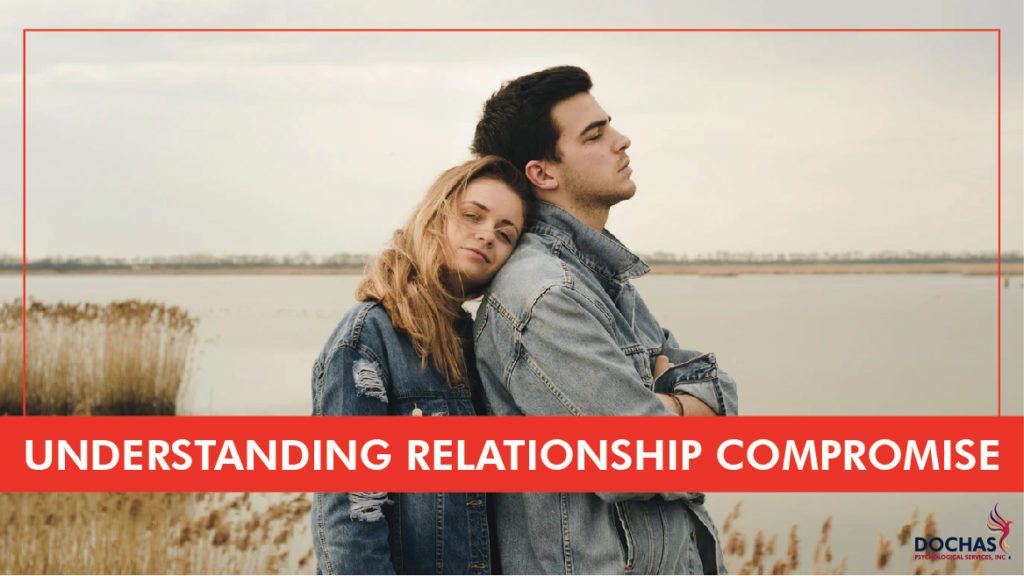Learning how to compromise can be a difficult journey for many couples. While it’s great in theory, compromising can feel like you are giving up your wants or needs. You may even feel taken advantage of. Understanding relationship compromise is important for not only your relationship, but for your personal validation and growth. Without the understanding of what compromise truly means, it becomes difficult to practice the task with your partner. This video will help explain what compromise is and how you can use it in your relationship without feeling like you’ve lost a competition.
Why Compromise Can Be Difficult
Some people find it very hard to compromise, no matter who the person is or what the situation might be. It’s important to recognize that a person’s difficulty with compromise is not about their loss of control but more about their concern with being taken advantage of.
Having negative ideas about compromise is normal. Some people might feel that when they compromise with their partner they’ve lost a competition or their needs are less important than their partner’s.
The Key to Relationship Compromise
Of course there will be times where one partner’s needs will not be fully met, and oftentimes one partner feels as if they’re losing more than the other. The key to healthy compromise in a relationship is that no one in the partnership is more important than the other. It’s important that both partners feel that their needs are of equal interest. Without this step, compromise is impossible.
A Guide to Relationship Compromise
So how do we compromise in a relationship? Dr. David Burns talks about 5 secrets for effective communication. Referring to some of his ideas, we use the following model to help many of our clients who see us for couples counselling. These steps will help to understand how compromise works.
1. Acknowledge Your Feelings Quietly to Yourself
Taking a step back to acknowledge what you’re feeling without verbally speaking will help to de-escalate any tension. In this first step you will attach a name to your feeling such as sad, frustrated, angry, confused, etc.
2. Acknowledge Your Partner’s Feelings
This is the difficult part. Once you’ve named your feeling, you will then try to think of something your partner said that you can see as right or understand their perspective. For example, if your partner said you’re being too emotional, you can identify “you’re right, I am emotional right now.”
This can be hard, but telling your partner they are right in some way will make them more inclined to listen to your feelings and lead to a compromise.
3. Explain Your Feelings
After you’ve told your partner you can see where they’re coming from, you will then follow up with your feelings and concerns.
4. Recognize Your Partners’ Worth
Once you’ve explained your concerns, you will then follow up by telling your partner why they are important to you. Communicating why it’s important for you to resolve the situation is helpful for your partner’s understanding of your concerns. This can look like “You and your needs are important to me too. I hate it when we fight.”
5. Invite Your Partner to Solve the Problem Together

This is where compromise comes in. Asking your partner how you can both work together to ensure your needs are both met is a clear way to offer a compromise.
It’s important to remember that this will not always be perfect, but that is okay. Your partner will appreciate the effort you’ve shown to listen and understand where they’re coming from.
If you feel that compromise is particularly difficult, and there is little chance of both of your material needs being met, check out this blog with 7 helpful tips!
Compromise Is Never Perfect
Remember that compromise can be difficult even if both partners are putting in the effort. The hardest part of relationship compromise is taking a step back from your emotional response to try and listen to what your partner is saying. Although this part is difficult, this is where an emotional connection can happen. This emotional connection that you build while compromising will help make an imperfect situation more comfortable for both of you.
Relationship compromise is not about fighting or surrendering, it’s about both partners feeling equally important and validated in their feelings.
If you and your partner are seeking couples counselling, click here to connect with a Dochas professional.
About Dochas Psychological Services
Dochas Psychological Services is a well-established and trusted therapy clinic located in Spruce Grove, Alberta. At Dochas we value the idea that everyone deserves a safe space. Through connection and education, our team works hard to build a trustworthy relationship with each of our clients. It is our goal to create a community for our clients to feel like they belong.
Disclaimer
Information provided through Dochas Psychological Services blogs or vlogs are meant for educational purposes only. They are NOT medical or mental health advice. You can read more about our disclaimer here.



1 Comment.
[…] Set an agreement with your partner that you are both committed to reintroducing intimate conversations with one another. Agree that you are both willing to delve into these deep areas of your relationship, that you will both set aside the time to do the work, and that you will both try to be calm and present in these moments. Setting this agreement might take a bit of compromise. To learn more about relationship compromise, click here to read our blog. […]